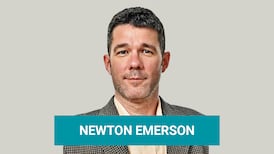The final three weeks may breathe more life into what has so far been a lethargic and uninspiring US presidential campaign. At this late juncture it is not surprising that it has attracted substantially less attention at home and abroad than in 1992. Although this may be simply because Mr Bob Dole has failed to make the breakthrough he needs to challenge President Clinton's strong lead in the opinion polls, it would be premature to write off the contest on the assumption that the incumbent is coasting to an easy victory.
So far, Mr Dole has concentrated on the main policy areas - the economy, taxation, welfare, law and order, foreign policy. While he has distinctive policies to offer, notably the 15 per cent tax cut and associated supply side economic policies, he has failed to drive them home against an agile opponent who can point repeatedly to the relative success of the US economy under his incumbency. This came over clearly in the first two television debates of the campaign last week, in which both Mr Clinton and Mr Al Gore scored well and were perceived to have maintained their leads. Mr Dole came over as a more human and attractive personality than previously perceived, an important factor given his rather leaden public image, but not enough to establish the momentum he needs to carry off a late rally that could galvanise his campaign.
So far he has carefully avoided attacking Mr Clinton personally concentrating been an honourable course; but it is surprising given the addiction to negative image advertising techniques so characteristic of US election campaigns. It is all the more so given the prominence the issue has assumed in the dense undergrowth of right wing and Republican rhetoric over the last four years. Mr Dole's approach has certainly not inhibited some of his colleagues, notably the House Speaker, Mr Newt Gingrich. Over the weekend he has floated on a phantasmagoric picture of drug addicts in the White House, illegal immigrants bringing AIDS into the country and leeching it of welfare, presided over, he says, by a President who has lied about the various scandals which Republicans insist exemplify his character.
It will be interesting to see whether Mr Dole chooses to change his policy in Wednesday's television encounter. It may well be that he has held to it so far because, for all the propaganda his party has generated about Mr Clinton's personality and character, little mud has been made to stick. Mr Dole knows that unless something extraordinary is revealed in the closing stages of the campaign he has more to gain than lose by resisting the temptation to endorse fully these right wing obsessions, which are not shared by the electorate at large.
Mr Clinton has, sensibly, simply avoided responding to them. He has concentrated on his record in office and on forthcoming policies that can provide a "bridge" to the twenty first century. It is a mixed record; but he may well win a second term based on the expectation that he has demonstrated a capacity to learn from mistakes and remain open to change. If this looks like opportunism to his opponents, they have not been able to display an equivalent flexibility and agility. Both main parties may, however, have a lot more to learn from the indifference which has so far been the most noteworthy public response to this lacklustre campaign.









